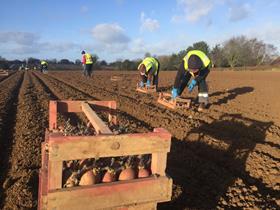
The government’s new seasonal workers scheme (SAWS) has received mixed reactions from industry figures, who claim it won’t fill the big labour gaps facing farmers.
Home Secretary Sajid Javid announced the new pilot scheme today, which will permit fruit and vegetable producers to recruit 2,500 non-EU migrants as seasonal workers for six months of the year during peak production.
The scheme hopes to alleviate significant worker shortages in British agriculture, with fruit and vegetables often being left to rot in the field due to staff shortages. The pilot will run during the UK’s transition period out of the EU from spring 2019 to December 2020.
Yet the government figure of 2,500 is much lower than the last SAWS scheme, disbanded in 2013, which provided temporary visas to 21,150 non-EU workers.
Nick Marston, chairman of British Summer Fruits said the move was to be welcomed, but will have “little effect” on the current crisis. “We welcome the recognition by government of the need for non-EU workers in horticulture in the UK and for the introduction of a SAWS scheme, albeit a ‘pilot’,” Marston said.
“However, UK horticulture employs 60,000 seasonal staff from the EU annually, with berries alone accounting for 29,000 workers.Our farms are reporting staff shortages of 10-20 per cent already, and to have any effect in terms of supporting our successful industry around 10,000 are needed now – not 2,500 – this numberwill have little effect on the current shortages UK farms are facing.”
Scottish soft fruit grower Peter Thomson, of Thomas Thomson told Scottish paper The Courier that the scheme may be “too little too late”, while executive chair of English Apple and Pears, Ali Capper, said there was still “work to be done”.
“The Government’s announcement is a promising response to a powerful argument that a shortage of workers willjeopardiseour future and is recognition that UK orchard fruit is a success story. This pilot scheme comes into force at a crucial time for our growers, but there is still work to be done,” Capper said.
“We need more than 11,500 seasonal workers by 2021 to keep pace with a crop that is set to grow. Right now, the pilot permits us to recruit 2,500. This is simply not enough and our growers are already struggling to recruit workers.”
Recruitment agencies are also unsure how much of an impact the pilot scheme will have on the wider industry.
“I think it’s obviously good for fruit farming, but it’s only going to touch the sides,” said Chris Francis, manager at Europeople, founded by potato farmer John Davison. “But the industry that’s really suffering is dairy, we supply a lot to dairy and livestock and there’s a huge crisis.”
It’s also unclear how helpful this will be in the face of a potential Brexit no-deal scenario. Such a departure from the Europe could also ultimately throw EU citizens’ legibility to work in Britain into doubt as well. “It’s like we’re talking about something else before sorting out what’s in front of us,” says Francis.
Francis adds that new non-EU recruitment is likely to come from Ukraine, Moldova and as far as the Philippines, from where livestock sector are already hiring.
Another worry for growers is how the pilot scheme will be rolled out. Who carries out the recruitment, and possesses the license to recruit remains unclear.
Marston expressed concern that a concentration of agencies licensed to recruit non-EU workers might have some “undesirable effects”, with monopolistic practises potentially raising charges, and also deterring newcomers to horticulture.
Commenting on the announcement, Defra secretary Michael Gove said the industry had made a “powerful argument” on the need to restart a SAWS scheme.
“From lettuce in East Anglia to strawberries in Scotland, we want to make sure that farmers can continue to grow, sell and export more great British food,” Gove said.
“This two year pilot will ease the workforce pressures faced by farmers during busy times of the year. We will review the pilot’s results as we look at how best to support the longer-term needs of industry outside the EU.”



